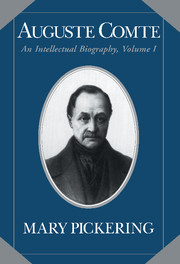Book contents
- Frontmatter
- Contents
- Acknowledgments
- Abbreviations
- Introduction
- 1 The Early Years
- 2 The Life and Works of Saint-Simon up to 1817
- 3 Comte's First Works for Saint-Simon
- 4 Comte's Growing Independence, 1819–1821
- 5 The Fundamental Opuscule and Comte's Rupture with Saint-Simon
- 6 The Aftermath of the Rupture: The Search for Connections
- 7 Comte's Efforts to Establish Himself
- 8 Intellectual and Mental Crises
- 9 The Road to Recovery, 1828–1830
- 10 Years of Success and Confrontation, 1830–1838
- 11 Comte's Changing Psyche and Aberrant Behavior, 1838–1840
- 12 The Encounter between Two Luminaries: Comte and Mill
- 13 1842: A Turning Point
- 14 Cours de philosophie positive: Positivism and the Natural Sciences
- 15 Cours de philosophie positive: Sociology
- Conclusion
- Bibliography
- Index
8 - Intellectual and Mental Crises
Published online by Cambridge University Press: 06 January 2010
- Frontmatter
- Contents
- Acknowledgments
- Abbreviations
- Introduction
- 1 The Early Years
- 2 The Life and Works of Saint-Simon up to 1817
- 3 Comte's First Works for Saint-Simon
- 4 Comte's Growing Independence, 1819–1821
- 5 The Fundamental Opuscule and Comte's Rupture with Saint-Simon
- 6 The Aftermath of the Rupture: The Search for Connections
- 7 Comte's Efforts to Establish Himself
- 8 Intellectual and Mental Crises
- 9 The Road to Recovery, 1828–1830
- 10 Years of Success and Confrontation, 1830–1838
- 11 Comte's Changing Psyche and Aberrant Behavior, 1838–1840
- 12 The Encounter between Two Luminaries: Comte and Mill
- 13 1842: A Turning Point
- 14 Cours de philosophie positive: Positivism and the Natural Sciences
- 15 Cours de philosophie positive: Sociology
- Conclusion
- Bibliography
- Index
Summary
Madame Comte does not at all fear this revelation; she has quite provoked it. … We must believe that he [Comte] brought against his wife an accusation that he knew was false [and] that he succeeded in believing in the existence of an imaginary fact. … One must not doubt, then, that Auguste Comte was ill. He invented the fatal secret just as he had imagined the utopia of the Virgin Mother, and he believed in the reality of the one just as he believed in the certain realization of the other. His hatred for his wife grew with his love for Clotilde de Vaulx [sic]; he pictured his wife capable of everything. From this to believing that she had committed everything that he imagined, there was only one step.
Griolet, Massin's lawyer, 1870THE CRISIS OF FEBRUARY 1826
Comte's articles on the spiritual power not only enhanced his reputation but reoriented his life. He began to understand more clearly the intellectual task that lay ahead of him. But in developing the new direction that he believed his thought had to take, he experienced a severe intellectual and physical crisis.
On February 20, 1826, two days after the appearance of the third article of “Considérations sur le pouvoir spirituel,” Comte started his next article.
- Type
- Chapter
- Information
- Auguste ComteAn Intellectual Biography, pp. 362 - 403Publisher: Cambridge University PressPrint publication year: 1993

